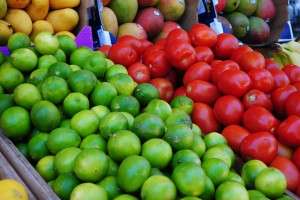Last week’s Metro Connection featured a mobile market that will drive to D.C.’s food deserts and sell produce at reduced rates.
Arcadia Foods [is] a small organization that works to bring fresh produce from fields of local farms to the dinner plates of D.C. residents. The founder, Mike Babin, now has his sights set on the food deserts of D.C. by putting farmers’ markets like this one on wheels.
“We’ve got a bus and we’re calling it a mobile market that is going to be outfitted as a farmer’s market. It’s going to roll into these communities and set up shop for one day a week to just provide that food to those communities,” [Mike Babin says].

Flickr: Lisa Williams
Finding fresh and affordable produce can be a challenge in some D.C. neighborhoods.
The U.S. Department of Agriculture defines food deserts as areas with poor access to large grocery stories — and D.C. has plenty of neighborhoods that qualify. The food desert definition doesn’t take into account whether neighborhoods without chain grocers have corner stores selling produce or farmers markets.
Some LeDroit Park residents have pointed out on the neighborhood’s Listserv that although the area lacks a big grocery store, there are a couple of neighborhood options, including Common Good City Farm and farmers markets and corner stores. Some alternatives to chain grocers may not be as affordable, but that’s not always the case.
Babin’s plans may provide a temporary fix to food deserts, but as reporter Marc Adams points out, getting people to actually buy the produce takes more than just bringing the food into neighborhoods. LeDroit Park resident Jana Baldwin, who uses food stamps, tells Adams that “many communities may feel that [the mobile vendor's produce] is only for a specific population and so it would have to definitely be marketed in a way that was inclusive to all communities.”



